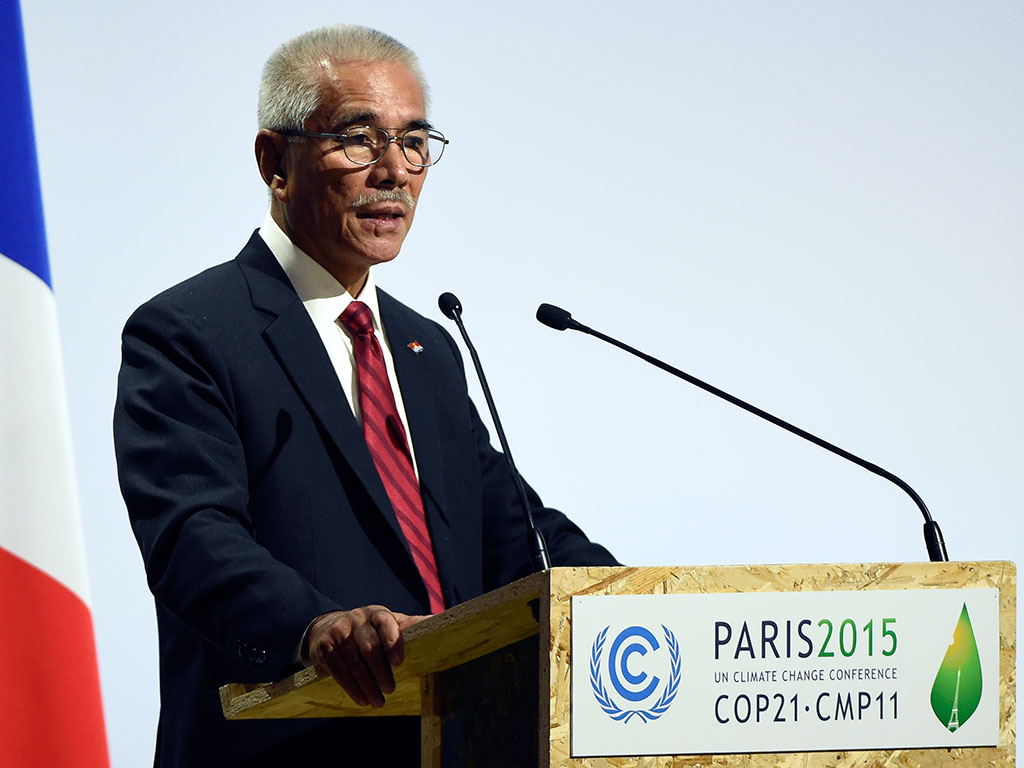COP21, day one: The key talking points in quotes
Here we break down the biggest issues at COP21, expressed in the words of the 150 or so world leaders in attendance

President Anote Tong of Kiribati, who spoke passionately about the impact of climate change on the pacific island - one of the countries worst affected by rising seas
UN Secretary-General Ban Ki-Moon opened the United Nations Framework Convention on Climate Change with the first in a series of 140 or so speeches. “You are here today to write the script for a new future. A future of hope and promise – of increased prosperity, security and dignity for all,” he said.
“Let us build a durable climate regime with clear rules of the road that all countries can agree to follow. Paris must mark a turning point. We need the world to know that we are headed to a low-emissions, climate-resilient future, and that there is no going back.”
The fallout of rising temperatures threatens real and immediate consequences for millions around the globe
For some, the issue of climate change is not just a concern for future generations, and the fallout of rising temperatures threatens real and immediate consequences for millions around the globe, many of which are among the most susceptible to poverty.
“We are on the front line; we will fall. It must not happen to anybody else,” said President Anote Tong of Kiribati, an island in the Pacific and one of the countries worst affected by rising seas. “The future of every men, women and children, all cultures, cities, villages hang in the balance, we must not remain indecisive going forward. To those of us whose survival is at stake, our plea is simple, let us give substance to the pledges that have been made.”
Juan Hernandez, President of Honduras, made a heartfelt plea to those gathered in Paris when he said, “For Honduras, climate change is a matter of life and death. The figures don’t add up… we are not all equally responsible.” Here the president made reference to the issue of accountability, and a number of developing nations agreed that the world’s wealthiest nations must shoulder the biggest burden.
“Developed countries are being miserly,” said Zimbabwe’s Robert Mugabe, “they burden us for cleaning up the mess they have created.”
Baron Waqa, President Of Nauru Baron Waqa, argued that island communities were paying a disproportionately high price for the effects of climate change. “The climate bill has finally come due,” he said. “Who will pay? Right now it is being paid by the smallest and most vulnerable. We see a small toll exacted every day as our shorelines are surely eroded. Small island communities are among the first to pay the price of climate change but no one will escape forever.”
French President Francois Hollande spoke in more general terms about the issues at hand, and urged those in attendance to take action. “To resolve the climate crisis, good will, statements of intent are not enough. We are at breaking point,” he said.
“I can’t separate the fight with terrorism from the fight against global warming. These are two big global challenges we have to face up to, because we have to leave our children more than a world freed of terror, we also owe them a planet protected from catastrophes.”
President Barack Obama also touched on the recent atrocity in Paris when he said, “What greater rejection of those who would tear down our world than marshalling our best efforts to save it?”
On the issue of climate change: “I’ve come here personally, as the leader of the world’s largest economy and the second-largest emitter, to say that the United States of America not only recognises our role in creating this problem, we embrace our responsibility to do something about it.”
China’s President Xi Jinping urged world leaders to consider how solutions might differ from country-to-country. “Addressing climate change should not deny the legitimate needs of developing countries to reduce poverty and improve living standards,” he said. “Tackling climate change is a shared mission for mankind … Let us join hands to contribute to the establishment of an equitable and effective global mechanism on climate change, work for global sustainable development at a high level and bring about new international relations featuring win-win cooperation.”
India’s Prime Minister Narendra Modi echoed Xi’s statements. “Climate justice demands that the little carbon space we still have, developing countries should have enough room to grow.” The fear for India and a number of other fast-growing economies is that a resulting deal could force conventional energy into early retirement and make the issue of energy poverty more difficult to resolve.
Some in attendance made reference to what form an international agreement on climate change might take. The aim of the summit, according to the German Chancellor Angela Merkel, was to decide on “a binding UN framework” and a binding review mechanism to limit temperatures now and in the future.
“If we fail to achieve binding agreements, this could be the beginning of the burial of our civilization,” warned Ecuador’s president Rafael Correa. “It is not understandable that we have courts to force countries to pay financial debts but we do not have a court to enforce environmental debts.”
Ultimately, the first day of COP21 consisted of little more than generalities and sound bites, and Ikililou Dhoinine, President Of Comoros, summed it up best when he said, “We must accept the reality that climate change is accelerating more quickly than climate change negotiations.”













